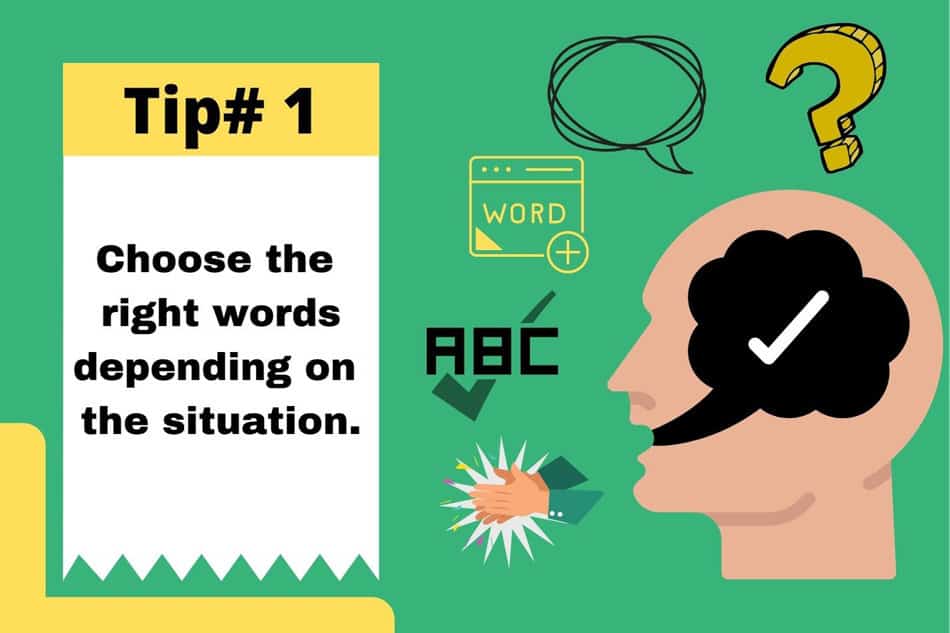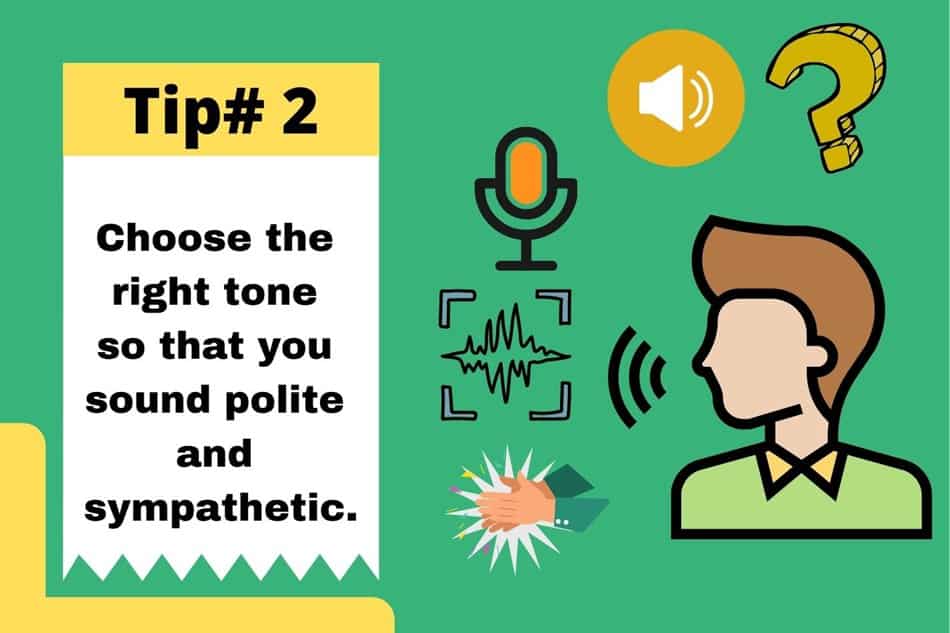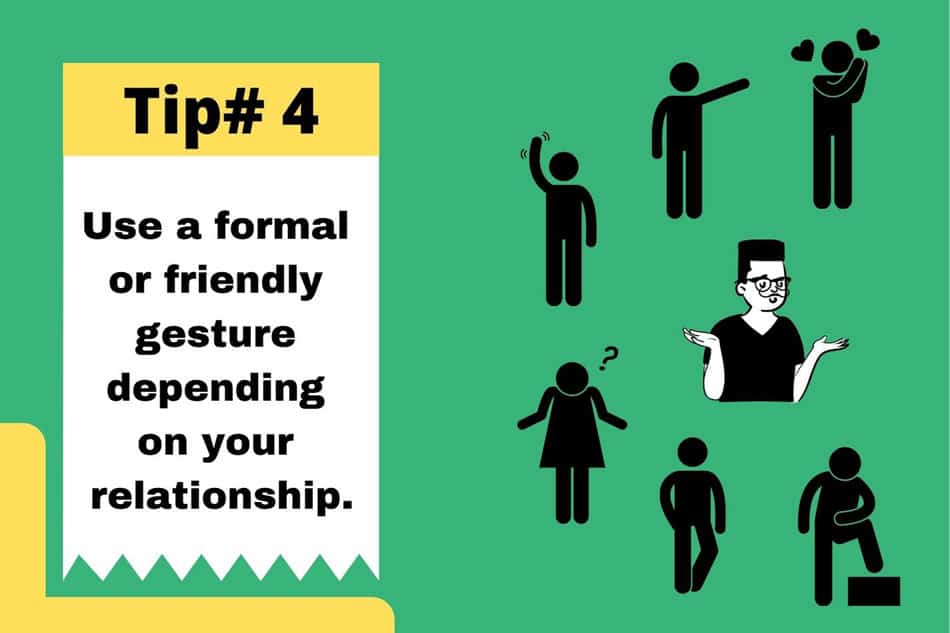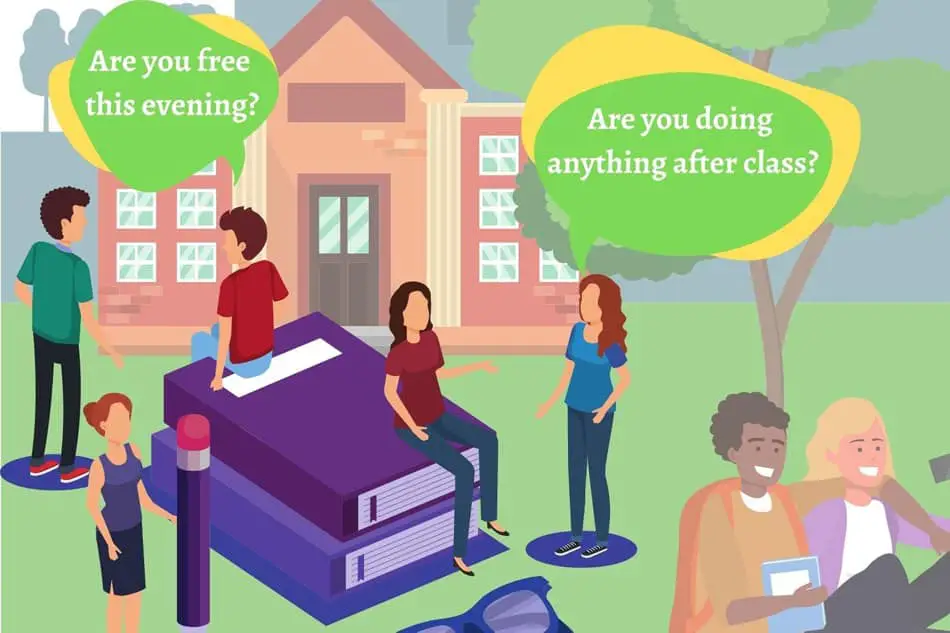This article covers the following areas –
- 5 Tips to Ask for Someone’s Time and Not Get Denied
- Are you…?
- Can you…?
- Do you…?
- Is this…?
- May I…?
- Let me know….
- Is your schedule open …?
- What are you up to…?
- Does this fit into your schedule?
- A Sample Conversation on Asking for Someone’s Availability
- Final Thoughts
- FAQ: Asking If Someone Is Available
When you ask for some time from someone, you don’t want to be ignored or denied just because of your inappropriate expressions or wrong choice of words. Remember! If you’re going to ask if someone is free or available, politeness is the key. Here, I will discuss some key phrases and polite expressions to help you confidently deal with such situations.
“Are you free…?” or “Are you available…?” are the most common expressions used to ask someone if they are free or available at a particular time. Likewise, “Does this fit into your schedule?” or “Is your schedule open…?” are two other polite expressions to ask about someone’s availability.
Besides the expressions mentioned above, there are so many other ways to ask someone about their availability. Here, I present a list of such expressions, and later in the post, I will discuss them in more detail with examples.
| Expressions | Examples |
| Are you…? | Are you free tomorrow? Are you available this afternoon? Are you doing anything after the office? Are you occupied on the 26th of this month? |
| Can you…? | Can you give me a moment? |
| Do you…? | Do you have a second? |
| Is this…? | Is this a good time to talk a little? |
| May I…? | May I have a few words with you? |
| Let me know…? | Let me know when you are not busy. |
| Is your schedule open…? | Is your schedule open today? |
| What are you up to…? | What are you up to at noon? |
| Does this fit into your schedule? | I want to talk to you tomorrow morning. Does this fit into your schedule? |
Are there any other appropriate expressions or tips that come to your mind in this regard? Share with all of us in the comment box. Well! If you are looking for a book or a guide to help you learn and improve your English, you may try English Made Easy Volume One: A New ESL Approach: Learning English Through Pictures (Amazon Link). This book creatively uses pictures and text in tandem to revolutionize English language learning, making it easier to understand and more effective overall.
Now, before I move towards the detailed discussion of the mentioned expressions and examples, let me give you some fundamental tips that can help you politely ask for time from someone.
5 Tips to Ask for Someone’s Time and Not Get Denied
Tip# 1: Choose the right words

Your right choice of words can work magically to have a good response from the other person within a conversation, particularly when requesting someone to give you some time. The right vocabulary can set the tone for the entire conversation and can greatly influence the response you receive.
When asking for time, it’s important to be courteous and clear. Phrases like “Would it be possible…”, “Could we discuss…” or “I would appreciate if we could meet…” are polite yet assertive ways to initiate the conversation.
Avoid being overly casual or demanding, as this can put the other person on the defensive. Instead, opt for a respectful language that shows that you value their time as much as your own. Keep reading the post to the end to know the right vocabulary to ask if someone is available.
Tip# 2: Choose the right tone

The tone of your voice can be just as important as the words you choose. A polite, understanding, and empathetic tone can open doors and make the other person feel respected. Matching your tone to the context of the relationship and the situation is crucial.
For example, a request made to a superior at work would typically have a more formal and respectful tone than a casual and friendly tone when asking a friend or family member. Remember, the way you speak often reflects your attitude and can significantly impact how your request is received.
So, regardless of who you talk to, your tone must be polite and sympathetic. If you are good to others, you can only expect others to be good to you. So, when you ask someone to give you some time, you must be careful in which tone you ask them to allow you some time so that you can talk to them.
Tip# 3: Be specific about the time & place, or ask them to decide

When requesting someone’s time, clarity is key. If you have a specific time and place in mind, state it clearly. This shows that you’ve considered the details and are considerate of their schedule.
For example, saying, “Are you available to meet on Thursday afternoon for coffee?” is more effective than a vague “Let’s meet up sometime.” However, be flexible. If you’re unsure about their availability or want to give them the choice, you can say, “I’d like to meet to discuss [topic]. When and where would be convenient for you?”
This approach demonstrates respect for their time and schedule. So, it’s best to suggest a specific time, i.e., weekend, afternoon, today, tomorrow, etc., while asking for someone’s availability. But if you think the other person deserves to choose the time and place, ask them to decide. You should not pressure the other person so they feel bound to give you time even if they don’t feel like being available for you.
Tip# 4: Use a Formal or Friendly Gesture

Non-verbal cues, like your body language, are crucial in communication. A friendly smile, open posture, and attentive demeanor can make your request more approachable and genuine.
In a professional setting, maintaining a respectful and formal posture is key. Conversely, relaxed and open body language can create a friendly and inviting atmosphere in a more casual or familiar setting. Be mindful of your gestures and facial expressions, as they should align with the nature of your relationship and the context of your request.
So, your body language matters a lot. A positive and polite gesture helps to get proper attention from the person you are asking for time from. You may be a little informal and friendly if you have an informal relationship with the person (i.e., family, friends, etc.). However, you should be formal and wise about choosing your words if you have a formal relationship with the person (i.e., teacher, senior supervisor, client, etc.).
For those who want to improve their non-verbal communication, I would suggest Brandon Cooper’s Body Language Mastery: 4 Books in 1 (Amazon Link). I believe this book is the ultimate psychology guide to analyzing, reading, and influencing people using body language, emotional intelligence, psychological persuasion, and manipulation.
Tip# 5: Make Eye Contact While Asking

Eye contact is a powerful tool in communication. It conveys confidence, sincerity, and respect. When making your request, maintaining appropriate eye contact shows that you are fully engaged and serious about the conversation.
It helps establish a connection and can make the other person feel acknowledged and important. However, be mindful of cultural differences, as the norms regarding eye contact can vary greatly.
Now, let’s learn some English expressions to help appropriately ask someone if they are Available.
Are you…?

“Are you free tomorrow?” is the most common way of asking your friends or colleagues if they are accessible at a specific time. And, of course, you can use the word “available” instead of the word “free.” Here are some examples.
| Are you | free available | at this time? now? tomorrow? in the evening? this weekend? to talk a little? right now? this afternoon? |
| Are you | doing anything | after the class? this noon? |
Can you…?

If you ask someone, “Can you give me a minute?” it means you are asking the person whether it is possible to give you a minute. This expression is not only used to ask for time but also used to ask for permission.
The word “can” is usually used to discuss someone’s ability to do something. Similarly, asking someone, “Can you give me a minute?” means asking the person whether it is possible to give you a minute. This expression is not only used to ask for time but also used to ask for permission.
To learn different expressions of asking for permission, you can read another write-up titled How to Ask for Permission Politely in English. Let’s find some examples below.
| Can you | give me | a second? a minute? a moment? |
Do you…?

“Do you…?” is similar to the expression “Can you…?” If you say, “Do you have time?” apparently, it seems like a question, but it’s a request. You ask the person whether it is possible to give you some time.
However, many other ways of making polite requests in different situations exist. You can check one of my articles titled Making Polite Requests: Formal, Informal, and Semi-formal. The following examples will help to make the idea clear.
| Do you | have | time? a second? a moment? a minute? a sec? |
Is this…?

Like “Do you…?” the expression “Is this…?” also appears to be a question. However, if you say, “Is this a good time to talk a little?” you are actually asking for permission. You are trying to know whether the person you are talking to will allow you some time or not.
| Is this | a good time | to talk? to talk a little? to speak for a while? to talk for a moment? |
May I…?

“May I…?” is one of the most popular polite expressions used to ask for permission. To ask for time from someone, we frequently use sentences like “May I have a word with you?” Again, it seems like a question, but it is commonly used to ask for permission politely in formal situations.
| May I | have a word | with you? |
| May I | have a minute have a moment | from you? |
Let me know….

We use the expression “Let me know when you are free?” to ask someone when she or he is available. Suppose you called your friend Sara to talk about a matter, and she replied, “I am a bit busy right now. Can we talk later?”
In this context, you can say, “Let me know when you are not busy.” The expression shows that you are giving importance to whatever the person is busy with. You also clarified that you are okay with it and ready to discuss the matter later based on her availability.
| Let me know | when you are | free. not busy. |
Is your schedule open …?

Though the expression “Is your schedule open…?” is not quite common in our everyday life, it is commonly used in formal and semi-formal contexts.
Suppose you met with a client a few minutes ago and could not decide about the matter. In this situation, you may need another day to talk about it. What do you say then?
You ask your client if he is free tomorrow by saying, “Is your schedule open tomorrow?” This is a very polite expression to ask for time from someone in a formal situation.
Here are some variations you can use in a professional or formal context to ask someone if they are free.
| Is your schedule open | at this time? now? today? tomorrow? in the evening? this weekend? to talk a little? right now? this afternoon? after the class? this noon? |
What are you up to…?

“What are you up to…?” is used in informal situations. Suppose you and some other friends plan to watch a movie at Star Cineplex Hall this weekend. You want to ask your close friend, Robben if he can join. You ask Roben about his availability by saying, “What are you up to this weekend?” If Robben doesn’t have other plans, he will let you know.
| What are you | up to | this weekend? this afternoon? after lunch? |
Does this fit into your schedule?

One of the most polite expressions that we use to ask for someone’s time is, “Does this fit into your schedule?” When you ask about someone’s schedule in this way, it reveals that you are concerned about the person’s flexibility. That means if your desired time doesn’t fit into the other person’s availability, you are ready to negotiate or change yours.
Example 1: I would like to talk about this tomorrow. Does this fit into your schedule?
Example 2: May I have another meeting on the 12th of this month? Does this fit into your schedule?
Before moving to the next part of this post, I would like to share about a book that can help you improve your conversational skills. 110 Real Life English Conversations (Amazon Link) is a great book for ESL learners and teachers, providing various conversation and situational dialogues, 223 everyday English expressions, and idioms. It’ll certainly help you to gain the confidence to speak English in real life.
A Sample Conversation on Asking for Someone’s Availability
The following is a conversation between Mr. Aki and Robin in which Robin asks Aki about his availability differently.
Mr. Aki: Aki’s Residence. How may I help you?
Robin: Hello, sir. This is Robin from the Veteran Welfare Foundation. May I have a word with you?
Mr. Aki: Go on. What’s this about?
Robin: It’s the Annual Veteran Reunion Function, sir. This year, we’ve chosen you as our Chief Guest. Your financial contribution to this foundation last year was commendable!
Mr. Aki: That’s flattering! I’m honored.
Robin: The honor is ours, sir. The function will be held on the 5th of December. Does this fit into your schedule?
Mr. Aki: Mmm…. I think my schedule is open.
Robin: Great! Can you spare a moment so I can fill you in on some program details?
Mr. Aki: Okay. But keep it brief.
Robin: Definitely. The function begins at 10 AM — a refreshment break for 30 minutes — then it resumes and continues until lunch at 2 PM. We kept a 15-minute speech schedule for you just before lunch. Does this schedule sound good to you, sir?
Mr. Aki: I won’t be able to sit for long. Is it okay if I come one hour before my speech?
Robin: That won’t be a problem. We’ll manage.
Mr. Aki: So nice of you. I’ll put that in my journal, then.
Final Thoughts
Asking if someone is available requires balancing between respect, clarity, and empathy. It’s about more than just finding a convenient time; it’s about forging a connection that values the other person’s time and commitments.
In every interaction, remember that you’re not just asking for a slice of someone’s time; you’re requesting a piece of their day. Approach each request with the awareness that time is a valuable commodity and that your respect for their time reflects your respect for them as individuals.
By integrating the expressions and tips into your approach, you can navigate the delicate task of asking for someone’s availability with grace and effectiveness, paving the way for positive and productive interactions in both your personal and professional life.
FAQ: Asking If Someone Is Available
1. Why is it essential to inquire about someone’s availability in a considerate manner?
Approaching the topic with politeness and sensitivity ensures the person feels respected and valued, leading to more effective and positive communication.
2. What are typical phrases to use when checking if someone is available?
Common expressions include “Do you have a moment?”, “Is now a good time?” or “Can we chat briefly?”
3. Is there a preferred method to ask someone if they’re available, especially in a professional setting?
It’s often considered respectful to send a brief message or email first, especially in a formal setting or with higher-ups. This allows the person to prepare or schedule the conversation.
4. How can I gauge if someone is genuinely available or just being polite?
Observing non-verbal cues, such as body language or tone of voice, can provide hints. If someone seems hurried or distracted, it might be better to reschedule.
5. What’s the best way to respond if someone isn’t available when I approach them?
A simple acknowledgment like “No worries, let’s connect later” or “Just let me know when you’re free” is appropriate.
6. How often is it acceptable to check someone’s availability if they’re frequently busy?
While persistence can sometimes be appreciated, balancing it with respect for the other person’s time is essential. If someone is continually unavailable, consider discussing a set time to connect.
7. Should I always specify the reason when asking someone if they’re available?
Providing a brief context is generally courteous so the person knows what to expect and can prepare accordingly.
8. How can I politely ask someone’s availability without seeming intrusive?
Being direct and respectful, such as saying, “I wanted to discuss something with you; when would be a good time?” can be both polite and effective.
9. Is asking about someone’s weekend or after-hours availability in a professional setting okay?
Typically, it’s best to avoid inquiring about non-working hours unless it’s common practice in the organization or if there’s a pressing matter that both parties agree to discuss.
10. How can I ensure that I respect the other person’s time when asking for their availability?
Be flexible with your timing, be concise with your conversation, and always express gratitude for their time, regardless of the outcome.
If you have further questions or suggestions about anything specific related to this topic or anything else related to learning English as a second language, feel free to ask me in the comment box. You may also help the ESLA community by putting your valuable suggestions here to help every member improve their English language skills.






1 thought on “How To Ask If Someone Is Available”